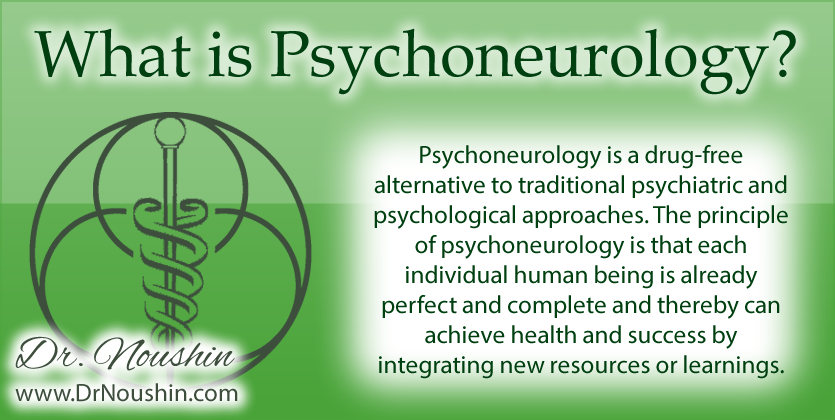
Psychoneurology is a study of the interaction of the brain and nervous system and the way in which our experience of the world is composed of various building blocks/elements. By altering these elements, we can create a corresponding change in our feelings, behavior, attitude, and how we experience the world. In Psychoneurology, our focus is generating and adding new choices/options to the patient (referred to in Psychoneurology as “resources”), which will change how they experience and respond to their world. These methods can often be used in lieu of a number of psycho-active medications (drugs), usually with remarkable and lasting results.
In Psychoneurology, we view human beings as whole and complete, instead of broken or fractured. Rather than labeling the client, we gather the information that will be necessary for the creation of a successful outcome. This information gathering process is known as “calibration”. We then support the client in locating resources, insights, abilities, or talents that they are utilizing in other areas of life or not accessing at all. Finally, we help our clients to fully access and integrate these resources, which can then immediately start to be used in their lives in order to create new results or a different outcome.
In Psychoneurology our objective is to achieve the highest level of thriving, as opposed to merely negating illness or dis-ease. Psychoneurology combines the wisdom of ancient practices with results generated through leading-edge technologies to create optimal health. Advocating a world view that perceives human beings as fundamentally perfect, whole, and complete, we access resources of joy and wholeness.
There are 22 presuppositions in Psychoneurology on which we base our practice. For instance, the 14th presupposition in Psychoneurology states that: “Body and mind are parts of the same system”. When there is an ailment in the body that stems from a thought process, or an emotion which has not been dealt with properly, it will show up in a particular part or organ of the body as some kind of dis-ease, sickness or pain. A healthy mind creates a healthy body and vice versa.
We prefer to see our clients in person, one-on-one, instead of conversing on the phone, because as human beings we are always communicating. We observe the autonomic responses of our clients and connect with them through talking and listening as well as non-verbal cues. We interact with our clients throughout the whole session and are not a silent observer. Our clients often leave the session energetic, happy, and with new resources which can immediately be put to use in their everyday lives.
We believe that addictions, compulsive behaviors of any sort, and even phobias are survival mechanisms and the individual’s best available resources at the time. Through our variety of techniques, we will find alternative positive neural-pathways and help the client to integrate them into the internal structure of their experiences. The client is then able to replace the experience of phobia or addiction with other effective ways of dealing with life.
In summary then, Psychoneurology is: calibration, identifying the resource, and integrating these resources.Therefore, it is a destiny technology and outcome-based approach which comes from negating dis-ease, problems, issues, or symptoms. We are technicians utilizing protocols to facilitate transformation in our client by changing the neural-pathways (changing the way the client feels about some incident without losing the experience). Psychoneurology helps us to understand how our brain codes experiences. This is what enables us to make such surprisingly rapid changes in the client’s experience. Psychoneurology demonstrates that the more you focus thought and energy on an issue, (whether positive or negative) the more you will expand it. Based on this belief, we concentrate on “thriving and joy” in order to direct our subconscious to create more of what we want in our lives.


